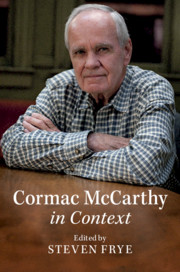Book contents
- Cormac McCarthy in Context
- Cormac McCarthy in Context
- Copyright page
- Contents
- Contributors
- Acknowledgments
- Chronology
- Part I Environments
- Part II Literary Contexts: Sources, Influences, Allusions
- Part III Intellectual Contexts
- Part IV Social and Cultural Contexts
- Chapter 18 North American Politics
- Chapter 19 Race and Cultural Difference
- Chapter 20 Ecology
- Chapter 21 Modernity
- Chapter 22 A Visual Artist and McCarthy
- Chapter 23 Cinematic Adaptations
- Chapter 24 Cinematic Influences
- Part V Archives, Critical History, Translation
- Works Cited
- Index
Chapter 19 - Race and Cultural Difference
from Part IV - Social and Cultural Contexts
Published online by Cambridge University Press: 12 December 2019
- Cormac McCarthy in Context
- Cormac McCarthy in Context
- Copyright page
- Contents
- Contributors
- Acknowledgments
- Chronology
- Part I Environments
- Part II Literary Contexts: Sources, Influences, Allusions
- Part III Intellectual Contexts
- Part IV Social and Cultural Contexts
- Chapter 18 North American Politics
- Chapter 19 Race and Cultural Difference
- Chapter 20 Ecology
- Chapter 21 Modernity
- Chapter 22 A Visual Artist and McCarthy
- Chapter 23 Cinematic Adaptations
- Chapter 24 Cinematic Influences
- Part V Archives, Critical History, Translation
- Works Cited
- Index
Summary
Overtly concerned with philosophical questions of human nature and deep time, the works of Cormac McCarthy nonetheless reflect historically contingent issues of race and cultural difference endemic to American culture in the post-civil rights era. While race and ethnicity are rarely in the foreground in his fiction, the tensions that arise from intercultural contact remain central to his narrative conflicts and to his vision of late capitalist modernity in the contested borderlands of Appalachia and the American Southwest. McCarthy’s depiction of African Americans, Native Americans, and Mexicans have drawn criticism for their reliance of stereotypes and familiar tropes of Otherness, even as these depictions inform his revisionist critique of hegemonic ideologies of imperialism, progress, and civilization. Likewise, his exploration of the mythological foundations of white Appalachian identity aligns with a consistent examination of the capacity for brutality and savagery in all humankind.
- Type
- Chapter
- Information
- Cormac McCarthy in Context , pp. 207 - 215Publisher: Cambridge University PressPrint publication year: 2020

